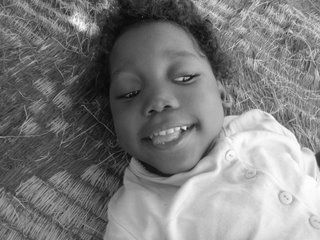Tucked in among the mud huts is a reed-covered roof open to the paddock, a welcome spot of shade when we’re outside. Under the shade roof, Jane Anne spreads out a mat (the kind you see men roll out on streets at prayertime) and sets up plastic lawn chairs. When the orphanage truck arrives, we and the nannies schlep the children over to the mat. The first order of business is to feed the children their breakfast—pureed beans (fu’ul, the national food of Sudan)—and then we play with the unoccupied children as, one by one, Jane Anne puts them on the horses.
Haifa comes every week. She’s bigger than most of the other children, but much more physically incapacitated. She can’t walk or even sit up. The nannies just lay her down flat on her back on the mat. She can’t eat solid food, either, and gets only milk for her breakfast. She’s too heavy to carry around for long, but Jane Anne keeps an old stroller at the paddock for her so she can be pushed around and see a bit more than the reeds of the shade roof. Haifa has an enchanting smile. She can’t do much to attract attention—no reaching or grabbing or talking to you—but if you happen to catch her eye, her face is instantly transformed into a warm, transfixing smile.

Last week at hippotherapy, Jane Anne had pulled out some toys for the waiting children. Isaac found a soccer ball. “Play soccer with me, Mom!” he begged.
“Let’s play with Haifa,” I suggested. So we put Haifa in the stroller and bumped it over the dusty field to a fairly open spot between the horse corral and the cow corral. Isaac kicked the ball (threateningly close to the cows).
“You go get it.”
“Then you come talk to Haifa and tell her what we’re doing so she won’t feel lonely,” I suggested.
He trotted over on his sturdy little two year old legs and put one hand proprietarily on the stroller awning while I chased the ball. I don’t know what he said to Haifa, and she probably didn’t either since the only time she ever hears English is once a week at hippotherapy, but she was smiling up radiantly at Isaac when I got back.
Our game soon evolved into a regular rhythm. While I was standing by Haifa’s stroller, Isaac kicked the ball (once into the cow corral—ai yi yi) and while I chased it down, he ran over to be with Haifa. He started going around to the back of the stroller and pushing aside the cloth to poke his head at her peek-a-boo style. She still gave him exactly the same radiant smile, whether he was startling her or not, and they both seemed to thoroughly enjoy the game.
No comments:
Post a Comment